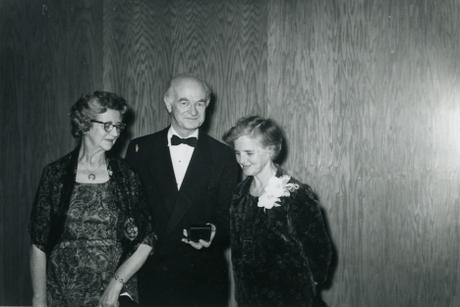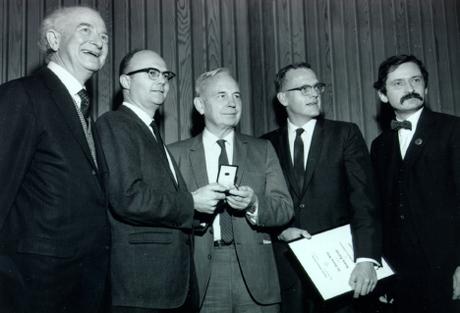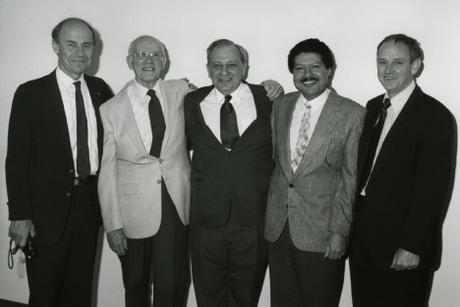
Lucile Jenkins (Pauling’s sister), Linus Pauling and Ava Helen Pauling at the Pauling Medal ceremony, 1967.
[Part 2 of 2]
Ten years into the history of the Linus Pauling Medal, the two American Chemical Society sections that sponsored the award – the Puget Sound section and the Oregon section – decided to edit and modernize their nominating process for the 1976 presentation. Essentially, the sections sought to streamline their process and improve ease of comparison by requiring that nomination packets for each nominee be submitted in the same format, and that specific types of information be included for every individual under consideration.
The 1976 nomination round also included a ramped up discussion of including more women among the pool of nominees, though in fifty years still only one female has received the medal. Caltech’s Jacqueline K. Barton, the Pauling Medal awardee for 2007, is likewise the first female recipient of a number of other prestigious decorations in chemistry, including the National Medal of Science and the Priestley Medal. Barton is also married to a fellow Pauling Medal winner, Peter Dervan, who received the prize eight years before his wife.

Pauling, Edward Barnes, Henry Eyring, and two unidentified individuals at the ceremony honoring Eyring as Pauling Medalist for 1969.
At a meeting held in June 1977, the two sponsoring sections discussed a further major change: adding the support of the Portland ACS section to the nominating and awarding committees. Though the benefits of including a third organizational body to absorb the logistical work and the costs of the event were evident to all involved, it was agreed that the three sections would need to wait six more years before Portland could be included, specifically because six medals had already been cast bearing the joint sponsorship of the Puget Sound and Oregon sections. Another six years would also give the three committees plenty of time to work out any kinks that might arise through the addition of another section to the nominating and awarding process.
As it happened, it actually took longer than six years to jointly award the medal across all three sections. The Portland group finally came aboard as a formal awarding body in 1987, at which point the medal was presented in the Rose City every third year, beginning in 1989.

Dudley Herschbach, Seymour Rabinovitch, Rudolph Marcus, Ahmed Zewail and William H. Miller at the Pauling Medal ceremonies honoring Marcus in 1992. Herschbach, Marcus and Zewail are all Nobel Chemistry laureates.
Over the course of its fifty years, the Linus Pauling Medal has been bestowed upon an accomplished group of scientists, most of whom have received other top awards in the field of chemistry broadly as well as a variety of decorations in their areas of specialization. Over a third of the Pauling recipients have also won the Priestley Medal, which is the highest honor given by the American Chemical Society and typically recognizes a lifetime of achievement. Likewise, over half of the Pauling Medal roster has received the National Medal of Science – the highest award that a scientist can receive from the United States government – and more than a quarter are Nobel laureates.
Unsurprisingly, the Pauling Medal list includes a great number of chemists who were close colleagues of and, in some cases, collaborators with the award’s namesake. Several of Pauling’s former graduate students and post-docs are also sprinkled throughout.
Here are the fifty recipients of the Linus Pauling Medal:
- 1966: Linus Pauling, Staff Member, Center for the Study of Democratic Institutions
- 1967: Manfred Eigen, Director, Max Planck –Institute for Physical Chemistry, Gottingen, Germany
- 1968: Herbert C. Brown, Professor of Inorganic Chemistry, Purdue University
- 1969: Henry Eyring, Dean of the Graduate School and Professor of Chemistry, University of Utah
- 1970: Harold C. Urey, Professor at Large, University of California at San Diego
- 1971: Gerhard Herzberg, Division of Pure Physics, National Research Council of Canada
- 1972: E. Bright Wilson, Professor of Chemistry, Harvard University
- 1973: E. J. Corey, Professor of Organic Chemistry, Harvard University
- 1974: Roald Hoffman, Professor of Chemistry, Cornell University
- 1975: Paul Bartlett, Professor of Chemistry, Texas Christian University
- 1976: F. Albert Cotton, Professor of Chemistry, Texas A & M University
- 1977: John A. Pople, Professor of Chemical Physics, Carnegie-Mellon University
- 1978: Dudley Herschbach, Professor of Chemistry, Harvard University
- 1979: Daniel E. Koshland, Jr., Professor of Chemistry, University of California at Berkeley
- 1980: John D. Roberts, Professor of Chemistry, California Institute of Technology
- 1981: Henry Taube, Professor of Chemistry, Stanford University
- 1982: George C. Pimental, Professor of Chemistry, University of California at Berkeley
- 1983: Gilbert Stork, Professor of Chemistry, Columbia University
- 1984: John S. Waugh, Professor of Chemistry, Massachusetts Institute of Technology
- 1985: Harold A. Scheraga, Professor of Chemistry, Cornell University
- 1986: Harry B. Gray, Professor of Chemistry, California Institute of Technology
- 1987: Harden M. McConnell, Professor of Chemistry, Stanford University
- 1988: Keith Ingold, Associate Director of the Division of Chemistry, National Research Council of Canada
- 1989: Neil Bartlett, Professor of Chemistry, University of California at Berkeley
- 1990: James P. Collman, Professor of Chemistry, Stanford University
- 1991: Rudolph A. Marcus, Professor of Chemistry, California Institute of Technology
- 1992: Kenneth Wiberg, Professor of Chemistry, Yale University
- 1993: Richard Zare, Professor of Chemistry and Physics, Stanford University
- 1994: James Ibers, Professor of Chemistry, Northwestern University
- 1995: Alexander Rich, Professor of Biophysics, Massachusetts Institute of Technology
- 1996: Kyriacos C. Nicolaou, Professor of Chemical Biology, Scripps Research Institute
- 1997: Ahmed H. Zewail, Professor of Chemistry and Physics, California Institute of Technology
- 1998: Allen J. Bard, Professor of Chemistry, University of Texas at Austin
- 1999: Peter B. Dervan, Professor of Chemistry, California Institute of Technology
- 2000: Gabor A. Somorjai, Professor of Chemistry, University of California at Berkeley
- 2001: Tobin J. Marks, Professor of Catalytic Chemistry, Northwestern University
- 2002: John I. Brauman, Professor of Chemistry, Stanford University
- 2003: Robert H. Grubbs, Professor of Chemistry, California Institute of Technology
- 2004: Martin Karplus, Professor of Chemistry, Harvard University
- 2005: George Whitesides, University Professor, Harvard University
- 2006: Peter J. Stang, Professor of Chemistry, University of Utah
- 2007: Jacqueline K. Barton, Professor of Chemistry, California Institute of Technology
- 2008: Thomas C. Bruice, Research Professor in Chemistry and Biochemistry, University of California at Santa Barbara
- 2009: Stephen J. Lippard, Professor of Chemistry, Massachusetts Institute of Technology
- 2010: Armand Paul Alivisatos, Professor of Chemistry and Materials Science and Engineering, and Director of the Lawrence Berkeley National Lab, University of California at Berkeley
- 2011: Larry R. Dalton, Professor of Chemistry and Electrical Engineering, University of Washington
- 2012: Robert Cava, Professor of Chemistry, Princeton University
- 2013: Chad Mirkin, Professor of Chemistry, Professor of Medicine, Professor of Materials Science and Engineering, Professor of Biomedical Engineering, and Professor of Chemical and Biological Engineering, and Director of the International Institute for Nanotechnology and Center for Nanofabrication and Molecular Self-Assembly, Northwestern University
- 2014: Stephen Buchwald, Professor of Chemistry, Massachusetts Institute of Technology
- 2015: Barry M. Trost, Professor of Humanities and Sciences, Stanford University
